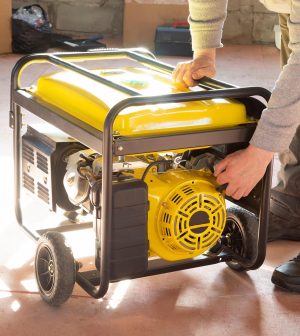- The Long-Term Effects of Daily Turmeric Supplements on Liver Health
- Could Your Grocery Store Meat Be Causing Recurring UTIs?
- Are You Making This Expensive Thermostat Error This Winter?
- Recognizing the Signs of Hypothyroidism
- 10 Strategies to Overcome Insomnia
- Could Artificial Sweeteners Be Aging the Brain Faster?
- Techniques for Soothing Your Nervous System
- Does the Water in Your House Smell Funny? Here’s Why
- Can a Daily Dose of Apple Cider Vinegar Actually Aid Weight Loss?
- 6 Health Beverages That Can Actually Spike Your Blood Sugar
As Nicole Pummels Florida, Experts Warn of Generator Dangers

Hurricane Nicole left thousands of Floridians without power Thursday morning, leading the U.S. Consumer Product Safety Commission to warn residents about the dangers of generators and candles.
The Category 1 hurricane made landfall south of Vero Beach on the East Coast and was quickly downgraded to a tropical storm. It was expected to dump heavy rain across central Florida before moving north toward Georgia. At about 6 a.m., nearly 176, 000 homes and businesses in Florida had no electricity, according to PowerOutage.us.
With the lights out, the likelihood of carbon monoxide poisonings and fires increases, the safety commission advised in a news release.
Using portable generators improperly creates a risk of carbon monoxide (CO) poisoning, which can be deadly within minutes.
People exposed to this colorless, odorless gas may become unconscious even before they can experience milder symptoms such as nausea, dizziness and weakness.
An average of 85 Americans die each year from CO poisoning caused by portable generators. Black Americans are considered to be higher risk, comprising 23% of generator-related CO deaths even though this group is only 12% of the population, the commission noted.
Generator safety
If you own or plan to buy a generator, here are some tips from the safety commission:
Never operate a portable generator inside a home, garage or shed, not even with open windows or doors. Lethal levels of the gas can still build up. An outside porch or carport is also too close to the house to operate a generator safely.
Operate these portable generators at least 20 feet away from the house. Direct the exhaust away from the home or any buildings someone could enter.
Close any windows and openings in the path of the generator. Follow generator instructions and warnings, and only use one that has been properly maintained.
Look for portable generators that have a CO shut-off safety feature. These turn the machine off automatically when high levels of CO are present around the generator. These models reduce CO poisoning by 87% to 100%, depending on the type. Look for those labeled as PGMA G300-2018 and UL 2201. The UL 2201-certified models have reduced CO emissions in addition to the CO shut-off feature.
Make sure your home has a battery-operated CO alarm or one with a battery backup on each floor and outside each sleeping area. Interconnected CO alarms are best, the CPSC advised.
Test CO and smoke alarms monthly, and replace batteries if needed.
Never ignore a sounding alarm. Get outside immediately. Then call 911.
Charcoal hazards
Using charcoal indoors can also produce lethal levels of CO. Don’t be tempted to grill in the garage, even with the door open.
Use flashlights instead of candles. If you do use candles, keep them away from anything that can catch fire. Extinguish them when you leave a room or go to sleep.
Appliance dangers
In a storm, appliances can get wet. That means they’re dangerous.
Do not touch an appliance that may have gotten wet and is still plugged in. Look for signs that your appliances have gotten wet.
Have a professional or your gas or electric company evaluate the appliance for safety. It’s also important to replace all gas control valves, electrical wiring, circuit breakers and fuses that have been under water.
Leave the house immediately if you hear or smell a gas leak. Contact local gas authorities from outside the home. Don’t use any electronics in the presence of a potential gas leak, including lights or phone, the CPSC advised.
More information
The U.S. Centers for Disease Control and Prevention has more on carbon monoxide poisoning.
SOURCE: U.S. Consumer Product Safety Commission, news release, Nov. 9, 2022
Source: HealthDay
Copyright © 2026 HealthDay. All rights reserved.










